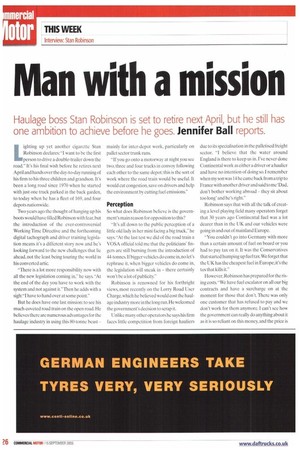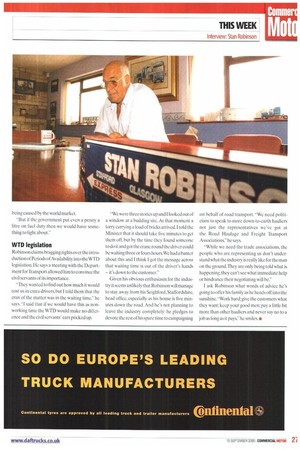Man with a mission
Page 26

Page 27

If you've noticed an error in this article please click here to report it so we can fix it.
Haulage boss Stan Robinson is set to retire next April, but he still has one ambition to achieve before he goes. Jennifer Ball reports.
Lighting up yet another cigarette Stan Robinson declares:"I want to be the first person to drive a double-trailer down the road." It's his final wish before he retires next April and hands over the day-to-day running of his firm to his three children and grandson. It's been a long road since 1970 when he started with just one truck parked in the back garden, to today when he has a fleet of 169, and four depots nationwide.
Two years ago the thought of hanging up his boots would have filled Robinson with fear, but the introduction of the ever-controversial Working Time Directive and the forthcoming digital tachograph and driver training legislation means it's a different story now and he's looking forward to the new challenges that lie ahead, not the least being touring the world in his converted artic.
"There is a lot more responsibility now with all the new legislation coming in," he says. "At the end of the day you have to work with the system and not against it." Then he adds with a sigh:"I have to hand over at some point."
But he does have one last mission: to see his much-coveted road train on the open road. He believes there are numerous advantages for the haulage industry in using this 80-tonne beast — mainly for inter-depot work, particularly on pallet sector trunk runs.
"If you go onto a motorway at night you see two, three and four trucks in convoy following each other to the same depot: this is the sort of work where the road train would be useful. It would cut congestion. save on drivers and help the environment by cutting fuel emissions."
Perception So what does Robinson believe is the government's main reason for opposition to this?
-It's all down to the public perception of a little old lady in her mini facing a big truck," he says. "At the last test we did of the road train a VOSA official told me that the politicians' fingers are still burning from the introduction of 44-tonnes. If bigger vehicles do come in, no let's rephrase it, when bigger vehicles do come in, the legislation will sneak in — there certainly won't be a lot of publicity."
Robinson is renowned for his forthright views, most recently on the Lorry Road User Charge,which he believed would cost the haulage industry more in the long run. He welcomed the government's decision to scrap it.
Unlike many other operators he says his firm faces little competition from foreign hauliers due to its specialisation in the palletised freight sector. "I believe that the water around England is there to keep us in. I've never done Continental work as either a driver or a haulier and have no intention of doing so.! remember when my son was 14 he came back from a trip to France with another driver and said to me 'Dad, don't bother working abroad — they sit about too long' and he's right."
Robinson says that with all the talk of creating a level playing field many operators forget that 30 years ago Continental fuel was a lot dearer than in the UK and our vehicles were going in and out of mainland Europe.
"You couldn't go into Germany with more than a certain amount of fuel on board or you had to pay tax on it. It was the Conservatives that started humping up fuel tax. We forget that the UK has the cheapest fuel in Europe; it's the tax that kills it."
However, Robinson has prepared for the rising costs. "We have fuel escalator on all our big contracts and have a surcharge on at the moment for those that don't. There was only one customer that has refused to pay and we don't work for them anymore. I can't see how the government can really do anything about it as it is so reliant on this money, and the price is being caused by the world market.
But if the government put even a penny a litre on fuel duty then we would have something to fight about."
WTD legislation
Robinson claims bragging rights over the introduction of Periods of Availability into the WTD legislation. He says a meeting with the Department forTransport allowed him to convince the civil servants of its importance.
"They wanted to find out how much it would cost us in extra drivers, but I told them that the crux of the matter was in the waiting time," he says. said that if we would have this as nonworking time the WTD would make no difference and the civil servants' ears pricked up. "We were three stories up and I looked out of a window at a building site. At that moment a lorry carrying a load of bricks arrived. I told the Minister that it should take five minutes to get them off, but by the time they found someone to do it and got the crane round the driver could be waiting three or fours hours.We had a banter about this and I think I got the message across that waiting time is out of the driver's hands — it's down to the customer."
Given his obvious enthusiasm for the industry it seems unlikely that Robinson will manage to stay away from his Seighford. Staffordshire, head office, especially as his house is five minutes down the road. And he's not planning to leave the industry completely: he pledges to devote the rest of his spare time tocampaigning on behalf of road transport. We need politicians to speak to more down-to-earth hauliers not just the representatives we've got at the Road Haulage and Freight Transport Associations," he says.
-While we need the trade associations, the people who are representing us don't understand what the industry is really like for the man on the ground.They are only being told what is happening,they can't see what immediate help or hindrance their negotiating will be."
I ask Robinson what words of advice he's going to offer his family as he heads off into the sunshine. -Work hard; give the customers what they want; keep your good men; pay a little bit more than other hauliers and never say no to a job as long as it pays," he smiles. •






































































































































































































